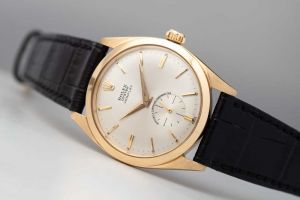Rolex 6512: Difference between revisions
ChronoAdmin (talk | contribs) |
ChronoAdmin (talk | contribs) |
||
| Line 6: | Line 6: | ||
Additionally, it was produced in relatively low quantities and only in precious metal: examples in both yellow gold and pink gold can be found (with pink gold seemingly much more rare). The result is a thin, precious metal watch with all the charm of a classic dress watch but a slightly more robust build that customers had come to expect from Rolex. | Additionally, it was produced in relatively low quantities and only in precious metal: examples in both yellow gold and pink gold can be found (with pink gold seemingly much more rare). The result is a thin, precious metal watch with all the charm of a classic dress watch but a slightly more robust build that customers had come to expect from Rolex. | ||
To achieve the Veriflat’s thin proportions, Rolex produced a new in-house manual winding caliber 1000. The movement was created by Rolex by taking its automatic caliber 1030 and removing the rotor. The caliber 1030 itself was Rolex’s first completely in-house movement, so it’s cool to think that once they figured out the whole in-house thing, they weren’t afraid to experiment, bringing new calibers and watches to market as a result. The caliber 1000 is an 18-jewel movement, adjusted for temperature and in five positions. It powers a subsidiary seconds at 6 o’clock, uncommon for a time-only Rolex in an Oyster case. The resulting movement measures just 3.45mm in thickness. The Veriflat is the close cousin of the Rolex Verislim reference 9164, a slightly dressier watch that also uses the caliber 1000. Around this same time, a partnership of Vacheron Constantin and Jaeger-LeCoultre introduced its caliber 1003, measuring just 1.64mm thick and taking the title of the world’s thinnest mechanical movement. | To achieve the Veriflat’s thin proportions, Rolex produced a new in-house manual winding caliber 1000. The movement was created by Rolex by taking its automatic caliber 1030 and removing the rotor. The caliber 1030 itself was Rolex’s first completely in-house movement, so it’s cool to think that once they figured out the whole in-house thing, they weren’t afraid to experiment, bringing new calibers and watches to market as a result. The caliber 1000 is an 18-jewel movement, adjusted for temperature and in five positions. It powers a subsidiary seconds at 6 o’clock, uncommon for a time-only Rolex in an Oyster case. The resulting movement measures just 3.45mm in thickness. The Veriflat is the close cousin of the Rolex Verislim reference 9164, a slightly dressier watch that also uses the caliber 1000. Around this same time, a partnership of [[Vacheron Constantin]] and [[Jaeger-LeCoultre]] introduced its caliber 1003, measuring just 1.64mm thick and taking the title of the world’s thinnest mechanical movement. | ||
==Links== | ==Links== | ||
Latest revision as of 17:26, 6 May 2021
Rolex 6512

The Veriflat Ref. 6512 is a vintage Rolex model that, despite its rarity, remains largely under the radar.
The Veriflat Ref. 6512 features a waterproof Oyster case, often thought more typical of Rolex’s sports watches (Submariner, GMT-Master, etc.). But, this Oyster case was the thinnest ever produced by Rolex, measuring just 9mm (and 34mm in diameter). To obtain this thin profile, Rolex engineered a special recessed case back so the movement could sit flat and the case could still retain its screw-down crown. Considering Rolex was still churning out Bubblebacks up to and around this time, it’s quite an accomplishment.
Additionally, it was produced in relatively low quantities and only in precious metal: examples in both yellow gold and pink gold can be found (with pink gold seemingly much more rare). The result is a thin, precious metal watch with all the charm of a classic dress watch but a slightly more robust build that customers had come to expect from Rolex.
To achieve the Veriflat’s thin proportions, Rolex produced a new in-house manual winding caliber 1000. The movement was created by Rolex by taking its automatic caliber 1030 and removing the rotor. The caliber 1030 itself was Rolex’s first completely in-house movement, so it’s cool to think that once they figured out the whole in-house thing, they weren’t afraid to experiment, bringing new calibers and watches to market as a result. The caliber 1000 is an 18-jewel movement, adjusted for temperature and in five positions. It powers a subsidiary seconds at 6 o’clock, uncommon for a time-only Rolex in an Oyster case. The resulting movement measures just 3.45mm in thickness. The Veriflat is the close cousin of the Rolex Verislim reference 9164, a slightly dressier watch that also uses the caliber 1000. Around this same time, a partnership of Vacheron Constantin and Jaeger-LeCoultre introduced its caliber 1003, measuring just 1.64mm thick and taking the title of the world’s thinnest mechanical movement.
Links
Credit - https://www.rescapement.com/blog/what-to-know-about-the-rolex-veriflat
